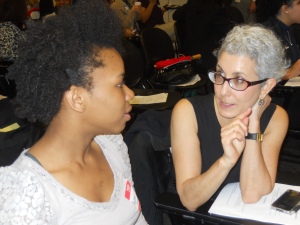Mentoring is an essential tool for moving organizations forward: young members learn new leadership skills and are given a lay of the land when it comes to their working environment. A new handbook by the Institute for Women’s Policy Research (IWPR), produced with funding and support from the Berger-Marks Foundation, provides valuable tools and information for developing and implementing mentoring programs for union members and staff.
The handbook, The Next Generation: A Handbook for Mentoring Future Union Leaders, defines and describes various types of mentoring, outlines strategies for addressing potential obstacles or roadblocks in the mentoring process, and includes methods for making mentoring programs sustainable. It also includes worksheets to help mentors and mentees get the most out of their mentoring relationship, and to enable union leaders to identify the strengths of their mentoring programs and possible areas for improvement. The guide can be used to begin a new mentoring program or to shore up one that’s already in place.
Mentoring can especially help women and people of color, who face specific challenges in advancing their careers. These programs can help women build professional networks and make connections—opportunities that are often otherwise not readily available. And mentoring programs can help unions cultivate more diverse leadership. Interviews with respondents who participated in union mentorship programs—as mentors or mentees—shed light on the benefits that mentoring had for these respondents and others in their unions.
“[As a result of the mentoring,] I ended up being very successful…the program that I was running ended up being held up as a model,” said one former union mentee. “And our international union has really recognized the work that I was doing. And that, I’m sure, would not have happened if I hadn’t gotten the help that I needed to be really successful.”
Caroline Dobuzinskis is the Communications Manager with the Institute for Women’s Policy Research.
To view more of IWPR’s research, visit IWPR.org




